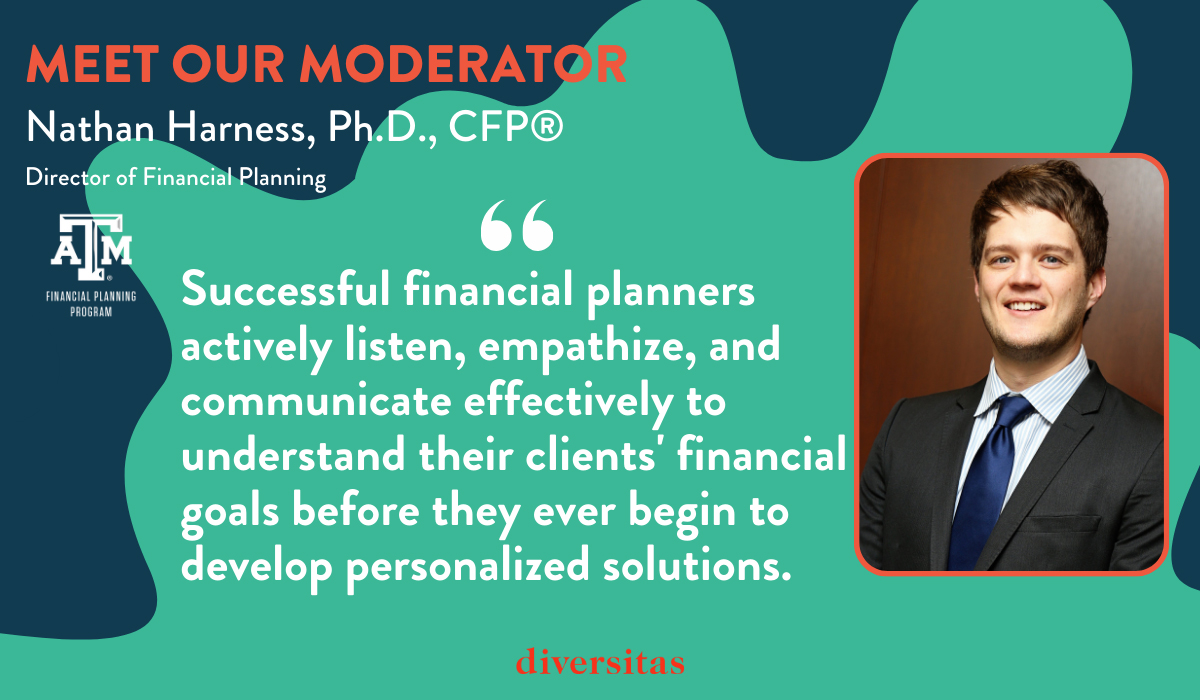The upcoming Forum is taking place Monday, November 13 from 2-3 pm ET and is the final panel on this series this year. The virtual event is free to attend and will dive into the future careers segment from the 12 Tribes of Financial Planning model. Register to attend here.
What characteristics or traits do you commonly see among successful professionals in this sector?
Financial planning is a dynamic profession that involves both analytical and relational engagement. The primary traits I have seen associated with success are intellectual curiosity, a client-centric mindset, and an ethical character. Like many other professions, the financial planning profession is dynamic. This requires that successful planners embrace lifelong learning. Financial planning strategies are always evolving because of the organic relationships with clients, the ever-changing tax law, and the development of new financial planning products. From new entrants to seasoned veterans, top professionals must stay updated on the latest industry trends, regulatory changes, and holistic strategies to provide the best advice to their clients. Given the need for solutions-focused plan development, it is easy to think that good financial planners are solely attuned to the technical, but this is not the case. We must understand our clients’ needs and future aspirations to serve them well. Successful financial planners actively listen, empathize, and communicate effectively to understand their clients’ financial goals before they ever begin to develop personalized solutions. Lastly, trust is paramount in financial planning. Successful financial professionals adhere to high ethical standards by maintaining integrity, transparency, and confidentiality in all their interactions.
If you could go back to your Junior or Senior year of college knowing what you know now (about the industry, the 12 Tribes Model, etc.), how would you change your approach to job hunting?
If I could go back to my senior year of college and have a short communication with myself, I would tell myself to purchase Microsoft and Apple stock. Then I probably wouldn’t need career advice other than how to spend my millions. But, if I was giving myself career advice, I would follow Socrates’ instruction of “know thyself.” New entrants to this profession oftentimes assume the first step in the job hunt is finding the best companies. Although that is an important part of the process, the first step is knowing who you are. It will help you better determine the goodness of fit within the industry and later help you provide better counsel to your clients. An exercise we often encourage in our students is a short self-reflection of your values, strengths, and passions. Spend some time considering what motivates and energizes you, as well as what you find fulfilling and meaningful. Use this as a tool when you build your goodness of fit matrix to select a company that aligns well. Along these lines, we encourage external assessment. Reach out to your career center or go online to explore career assessments and personality tests to gain insights into your strengths, preferences, and personality traits. Tools like Myers-Briggs Type Indicator (MBTI) and StrengthsFinder can provide valuable insights into your personality and help you understand how you can leverage your strengths in your career.
How did you get into the wealth management industry? What first attracted you to the space and why have you stayed?
I started in financial planning in late 2000, riding the wave of a decade of high-flying stock market returns. Within a few months, the S&P would begin a consecutive three-year period of negative returns for the first time since 1941. Needless to say, the profession was turned upside down. A shift was occurring in the industry. The primary value-add prior to this turning point had been an access model attempting to provide clients with superior returns. As access became more universal with the spread of online trading and as consumers experienced sustained negative returns, the profession begin a paradigm shift from access to advice. While this period was financially challenging, it was during this time that I developed a deep passion for financial planning. I begin to see that holistic financial planning was relational, not transactional. I started to expand my professional knowledge beyond investments to encompass areas such as retirement planning, estate planning, and taxes, to name a few. I was finding that client engagement oftentimes looked more like personal consulting and education. While I still appreciate the technical aspects of financial planning, it is the relationships I form with clients that truly anchor me to this helping profession. The ability to provide comprehensive guidance and make a positive impact on individuals’ financial lives has become the driving force behind my love for financial planning.[vc_row_inner][vc_column_inner width=”1/4″][/vc_column_inner][vc_column_inner width=”3/4″]Dr. Nathan Harness is the Director of Financial Planning at Texas A&M Universtity. Dr. Harness received his bachelor’s degree in finance from the University of Central Arkansas, a Master’s degree in finance from Texas Tech University, and a Ph.D. in personal financial planning from Texas Tech University. He currently serves as the TD Ameritrade Director of Financial Planning at Texas A&M University and teaches the Fundamentals of Financial Planning, Retirement Planning, and the Investments for Financial Planning courses. His research interests include household heuristics and wealth accumulation, gender differences in financial planning, and retirement decision making. Dr. Harness has also published in Applied Economic Letters, Financial Services Review, International Journal of Business and Finance Research, Journal of Financial Services Professionals, Financial Counseling and Planning, the Journal of Financial Planning, and the Journal of Personal Finance.
Before teaching at Texas A&M University Dr. Harness taught at the University of Georgia as an Assistant Professor of Financial Planning and at Texas A&M-Commerce as an Associate Professor of Finance prior to joining the financial planning program at Texas A&M University.[/vc_column_inner][/vc_row_inner]






